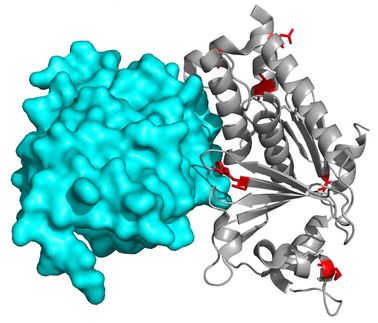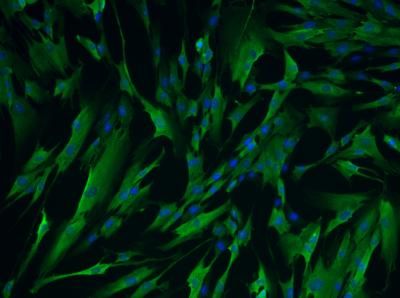Singapore scientists develop new synthetic protein that targets and kills cancer cells
Scientists from A*STAR's Genome Institute of Singapore (GIS) and the National University of Singapore (NUS) have developed a new synthetic protein fragment which can target and kill cancer cells. The team is now working on an improved version that will be more specific and therefore have fewer clinical side effects for the treatment of a group of cancers known to be caused by a family of disease-causing viruses. The groundbreaking research was recently featured on the cover of the prestigious scientific journal, Cell Cycle.
The team, led by Dr Stephen Hsu, Group Leader at GIS, and Assistant Professor at the Faculty of Medicine, NUS, successfully developed a short synthetic protein fragment that disrupts cell division. When applied to cancer cells, the fragment prevents further cell multiplication and leads to cell death. Cancer is the uncontrolled proliferation of cells leading to the development of tumours in the body.
The findings have shed new light on what was previously known about proteins that regulate cell division. Already, other laboratories in the USA and Europe have requested samples of the synthetic proteins to test the relevance of the team's findings to other biological contexts. International collaborations with these laboratories are being discussed.
Dr Hsu, a clinician-scientist who is also a practicing medical doctor at the National University Hospital (NUH), explained the significance of the discovery, "Although the synthetic protein fragments that we have developed are effective at killing many types of tumour cells, we are particularly interested in its use for the treatment of diseases such as genital warts and cervical cancer that are caused by members of a family of viruses - the human papilloma viruses. The synthetic protein fragments are predicted to be highly specific for tumours caused by members of this family of disease-causing viruses. We are hopeful it will lead to the development of drugs that will be highly specific and effective even when given at low doses."
According to Dr Hsu, currently available treatment using chemotherapeutic drugs tends to indiscriminately kill off both healthy and cancerous cells, resulting in the familiar symptoms and side effects such as hair loss, nausea and vomiting. "Our aim is to design a drug which will be very specific for the diseased cells because doctors can then prescribe it at relatively low doses, which in turn will cause less severe or minimal side effects," explained Dr Hsu.
A*STAR's commercialisation arm, Exploit Technologies Pte Ltd, has already filed a provisional US patent for the use of the novel protein fragment in the treatment of skin cancers, other skin conditions such as psoriasis and genital warts, and lesions in internal cavities such as the cervix and nose, which are common both in Singapore and worldwide. Genital warts and cervical cancers are known to be caused by human papilloma viruses.
According to the World Health Organization, one in every three cancers diagnosed is skin cancer?, while in the US, skin cancer is the most common cancer, with approximately one million people being diagnosed with skin cancer each year?. Skin cancer is typically associated with a change on the skin such as a growth, a sore that does not heal or even a skin mole that suddenly grows rapidly. Cervical cancer, on the other hand, is the fourth most common cancer amongst women in Singapore?, and the leading cause of death among otherwise healthy young woman in their 30's. The incidence rate in Singapore women, especially Chinese, is higher than that of most developed countries.
Commenting on the research, which is funded by A*STAR's Biomedical Research Council (BMRC), Associate Professor Kong Hwai Loong, Executive Director of the BMRC, said, "With the benefit of his own personal experience in clinical practice and treating patients, Stephen and his team have focused on developing a drug which will have practical life-saving implications. Ultimately, his work highlights the importance of bridging basic research and clinical practice, which translates the fruits of laboratory research into real, tangible healthcare benefits for the general public."
Moving forward, Dr Hsu's group has started work on designing improved "second generation" synthetic protein fragments that are expected to be even more effective against cancer cells. His team has recently generated preliminary results that show that the drugs are effective at preventing the growth of various types of tumours in mouse and chicken animal models. This is the first step towards paving the way for approved studies in cancer patients.






















































